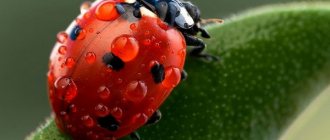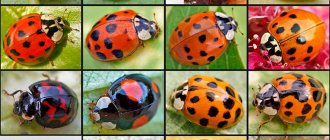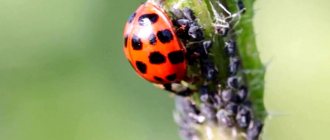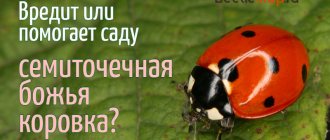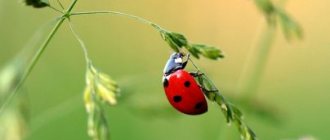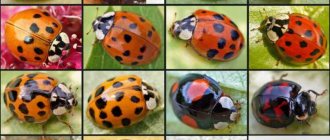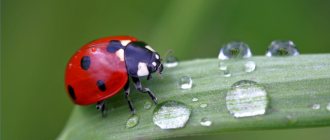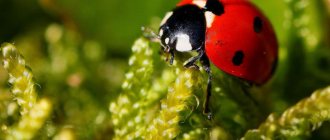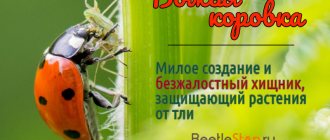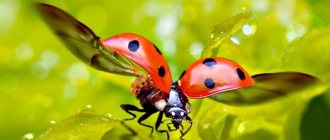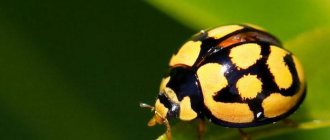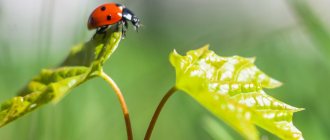- Encyclopedia
- The world
- Ladybug
The ladybug is a very common insect. They live on almost the entire planet, with the exception of Antarctica and permafrost. There are more than 4,000 species of these insects in the world. Some of them live on trees and bushes, others in the grass.
Ladybugs have very original and varied colors. The color of the elytra can be red, yellow, black, brown, blue. The spots are yellow, black, and white. They may merge with each other, or they may be absent. The colors are brighter in young individuals, but fade over time.
They belong to the family - beetles, order - Coleoptera. The shape of the body is convex at the top and flat at the bottom, round or oval. Length from 4 to 10 mm.
The seven-spotted ladybug is the most common in Russia. Body length 7-8 mm. Color – red with black spots.
Body structure of a ladybug:
— The head is small, motionless. The antennae are flexible and consist of 8-11 segments.
— Pronotum – convex, transverse.
- 3 pairs of legs, each of which consists of 4 segments: 3 visible, 1 hidden.
— The abdomen consists of 6 segments, which are covered with segmental semirings.
— 2 rear wings. In 1 second, the ladybug makes 85 swings with them.
— Fender flaps are necessary to protect the rear wings.
Ladybugs live from several months to 1 year. Most of them are predators. They feed on aphids. In Southeast Asia there are species that feed on plants.
Ladybug can protect itself from enemies. She secretes a toxic yellow liquid from her paws. In this way, the ladybug scares away spiders, frogs and other insects. Birds don't feed on them.
Ladybugs benefit people. These insects destroy pests that cause serious harm to agriculture.
There are different versions about the origin of such an interesting name. The most popular of them: the poisonous liquid secreted by insects is “milk”, which is why it was called “ladybug”, “ladybug” means that this insect is harmless to people.
In other countries, the ladybug is called differently: in Switzerland and Germany - “Virgin Mary’s bug”, and in Slovenia and the Czech Republic - “Sun”.
What does a ladybug look like: description
The ladybug is a small insect, with a body size of 4-10, 11 mm. The spotted beetle belongs to the order Coleoptera. The body has an elongated, oval-like or roundish shape. If you look from above, the body is highly convex, from below it is flattened. On the surface of many species, hairs are clearly visible - barely noticeable pubescence.
Body structure:
- head;
- front back;
- chest (including 3 sections);
- abdomen;
- 3 pairs of legs;
- wings with hard elytra.
The front back of the beautiful beetle has a transverse structure, highly convex, and a notch is clearly visible on the front edge.
The small head of the spotted beetle is slightly extended forward and motionlessly aligned with the front chest. The eyes are large, not protruding, the antennae are very flexible, consisting of 8 segments.
On the upper part there are spots of various colors and shapes, which do not appear immediately after birth, but after a couple of weeks.
The hind chest, in contrast to the front chest and middle chest, which are extended across the body, looks like a square.
The cute insect has 6 moderately long legs, each of which consists of 3 obvious and one hidden segment. The paws help the bug quickly pick up each blade of grass and crawl through the grass. The abdomen consists of 5-6 segments.
With the help of their hind wings, cute insects take flight. The front wings eventually degenerated into hard elytra. They serve as protection for the hind wings while the insect crawls through the grass.
Bugs of various colors secrete cantharidin (a dangerous poison), thereby protecting them from predators.
The protective covers of the bug can be painted black, yellowish, deep red, brownish or blue with black, red, yellowish or whitish spots. All points have different shapes. In many insects, the spots merge together, forming spreading patterns. Some insects do not have them at all. By the pattern you can understand and determine what gender the ladybug is.
The only enemy of insects is dinocampus. Even the brightly colored insect with spots and the hemolymph secreted by it cannot save the insect from obvious death. The fact is that dinocampus lay eggs precisely in the delicate bodies of ladybird pupae, sometimes even in adult individuals. While developing, individuals parasitize and kill their host.
According to scientists, birds do not pose a danger to insects, since they secrete a toxic substance that is dangerous to birds. The bright coloring signals that birds should not approach and scares them away.
What have we learned?
There are many types of ladybugs in nature. Most of them are predators. They help fight small pests in gardens and fields. A description of ladybugs, their lifestyle, information about what ladybugs eat will help 2nd grade students studying the world around them.
Previous
The world around usWhat is granite (grade 2, the world around us) - additional information for children, a brief description for the report
Next
The world around us Why is the sea salty - why there is more salt water in the sea than fresh water briefly for children
Where does he live?
Beautiful bugs are distributed across all continents. They populated all zones. The exceptions are areas where the temperature does not exceed 0°C throughout the year and Antarctica.
The insect can be found in all European countries: Great Britain, fragrant in the flowers of Denmark, Sweden, France, Iceland. Germany, Italy, and Poland also sheltered this bright insect. Ladybugs fly over India, Korea, the Islamic Republic, Japan, South and North America, and Mongolia. The distribution area also covers Laos, Myanmar, Indonesia and even Cambodia.
In nature, there are many species of bright representatives of the insect world, their classification is simply huge, and each of them prefers special habitats and each of them has a specific role. Some species settle on plants that have been damaged by aphids. Others can be seen on field and marsh grasses.
Ladybug - benefit or harm? Friend or foe?
From the encyclopedia we learned that ladybugs are very useful and indispensable in the fight against agricultural pests. They are specially bred in many countries and then released onto coffee, coconut and citrus plantations to kill pests. So gluttony makes beetles faithful allies of humans in the fight against many harmful insects.
And in the summer at the dacha, my grandmother and I conducted an experiment, and now we know for sure that ladybugs are our friends and helpers.
Here's how it happened: aphids appeared in huge numbers on the tomatoes in the greenhouse. We were in despair, the plants were withering before our eyes, the ovaries did not develop, and the harvest was in jeopardy. And then we remembered that ladybugs really love aphids. In a clearing behind the dacha, we caught beetles in a jar and released them into the greenhouse for each plant. After a few days there were no aphids on our tomatoes!
However, not all ladybugs are beneficial. Some of them, feeding on plants, can cause significant harm. Three such species are found in Russia. However, there are few herbivorous ladybugs and the harm from them cannot be compared with the enormous benefit that predatory species bring that exterminate pests.
Lifestyle
Ladybugs prefer to live “alone”, apart from other representatives of the species.
Only during the mating season do they come together to continue their family line. They also gather together for flights and wintering.
A ladybug can be called a fruit-loving bug, therefore, with the onset of a cold period, all insects living in temperate latitudes gather together and fly away to warm countries.
Among insects there is a sedentary species. They do not fly to countries with hot and dry climates, but gather in one place and winter in huge communities, reaching 400 million adult individuals. If you calculate how much such a “ball” weighs, you can get a figure equal to several tons.
To shelter from unfavorable climatic conditions, the “suns” hide in the ruins of stones and also take cover under fallen leaf blades of shrubs.
Under good conditions and the availability of food, spotted insects can live for 1 year. Under unfavorable conditions, the lifespan of insects does not exceed several months.
About the ladybug for children, methodological development on the world around us (preparatory group)
About ladybug for children
With the arrival of spring and summer, many different insects appear in nature. Children love to watch beautiful butterflies and beetles. When taking a walk in nature with children, you can definitely come across beautiful bugs with black dots. Among the huge variety of large and small beetles that busily scurry around gardens, fields and vegetable gardens, ladybugs are popular among people. Let's look at these bugs and tell the children about the ladybug.
Why are bugs called ladybugs, why are they bugs, if they are beetles, why do they have such a color, what benefits do they bring and how do they develop.
A story for children about a ladybug
These little bugs have a very attractive bright appearance. Their coloring is memorable at first sight. These insects have long earned human interest.
In many countries, various legends and superstitions are associated with them; people came up with proverbs and fairy tales about them.
We call them “ladybugs”. In some countries of Eastern Europe, these bugs are affectionately called “sun”, and in Western Europe - “Virgin Mary’s bug”.
Where do the bugs live? Everywhere except Antarctica. They are also found here, in the countries of Northern, Western and Eastern Europe, India, Great Britain, Italy and France.
Why are bugs called ladybugs? God's means meek, safe. Why a cow if it's a beetle? When it sits calmly in a person's palm, it is safe. And as soon as you press it a little, the insect secretes a yellow “milk” liquid. That's why they called her ladybug.
In general, beetles are predators. Ladybugs or coccenilides (as the family of beetles is called in Latin), like their larvae, feed mainly on aphids. For this they are also called aphid cows. In addition to aphids, ladybugs and their larvae destroy scale insects, spider mites, small caterpillars, and egg-laying insects, i.e. the most dangerous agricultural pests.
The bugs are very active, run quickly through plants and can fly long distances.
Bugs have a very enviable appetite. Each person needs fifty aphids a day.
Ladybug larvae also do not complain of lack of appetite: about a thousand aphids are required for their development. The larvae grow very quickly. Several generations can develop in a year.
Appearance of a ladybug
Insects look very bright. Their round backs are red, orange or yellow and covered with dotted spots. There can be a different number of points. There are individuals with two points, with 12, 30. The most common is the seven-spot ladybird.
By the way, the 28-spotted individual is a vegetarian and a pest: it eats potatoes, beets and clover.
Bright signs make ladybugs easily recognizable even by small children.
Entomologists also consider those with commas and dashes on their backs to be ladybugs, while others have a bizarre pattern. There are beetles even in a black outfit, and not just in a red or yellow suit. And they also have pea dots. There are more than 4,000 different species of ladybugs.
Varieties of ladybugs
Ladybugs have a head, pronotum, thorax, abdomen, 3 pairs of legs, hard elytra and transparent wings, with the help of which the insect flies. Large eyes and movable antennae.
The bug flies with the help of two hind wings, and the hard elytra serve as protection.
During flight, the insect makes up to 85 strokes per second. And it will be interesting for children to see that under the hard elytra there are transparent wings with which the insect flies.
Why does an insect need such a bright outfit? To protect yourself from enemies! This is a warning coloring: “I am not edible!” it says.
If you pick up a bug and inadvertently press it, it will release an orange drop. It contains the poison cantharidin. it is not dangerous for people, but if a bird grabs a ladybug, it will burn its throat so much that it will no longer want to touch it. This is how the little insect feels safe.
How does a ladybug develop?
In the spring, insects begin to have trouble breeding offspring. They are looking for a mate. The female lays up to 400 yellow eggs on the leaves of plants.
The female, taking care of her offspring, chooses plants that grow near the habitats of aphids. After 1-2 weeks, larvae emerge from the eggs. They first feed on the egg shell, as well as unfertilized eggs. Then they get to the aphids. The larval stage lasts 4-7 weeks. When the larvae accumulate nutrients, they turn into pupae. The pupa is attached to the leaf. After 7-10 days, an adult insect crawls out of the pupa shell. He doesn't have any spots yet. The bug sits and waits. Then the corresponding color and spots appear.
Adult beetles usually overwinter. They are thermophilic. If the climate is cold, ladybugs gather in flocks and fly to warmer climes. If they remain, they gather in colonies and hide under stones and tree bark and thus wait out the winter cold.
Wintering ladybugs
The benefits and harms of ladybugs
The gluttony of ladybugs brings great benefits to gardens and vegetable gardens in many countries. If one larva eats 50 aphids per day, then an adult insect eats up to 100 individuals.
The beetles are specially bred and then sprayed over gardens using aircraft.
But there are also harmful individuals that eat vegetables.
Interesting facts about the ladybug
Since ancient times, ladybugs have even been worshiped. The Slavs considered her a messenger of the Sun Goddess.
It was used to predict the weather. If the bug flies away from the palm on which it was sitting, then the weather will be good. And if he doesn’t want to fly, there will be bad weather.
Since ancient times in Western countries, people have considered the ladybug a symbol of good luck. The image of a bug on clothes was like a talisman.
There are many signs associated with this bug. If a ladybug flies towards you, do not rush to drive it away so as not to frighten away your fortune. Having flown into the house, it promises peace and harmony, and for childless families, the appearance of a child.
Reproduction
The appearance of offspring depends on the species: insects reproduce in spring or autumn; depending on the variety and belonging to a particular species, an adult individual of a bizarre bug can lay 3-300 eggs.
Ladybug larva: the process of transformation
An interesting fact is that “suns” lay eggs near aphid settlements. The development cycle of the larva lasts no more than a week. While developing, it feeds on aphids daily.
Full maturation occurs by the second week of development. The time is already coming when you can observe the transformation of the larva into a pupa. After 7 weeks, an adult is born from the pupa.
If during growth the insects do not have enough main food - aphids - to saturate their bodies, the bugs fly to the beaches. During the flight, their presence annoys even people. Some people complain of weak bites from the seven-spotted ladybug.
What determines the number of black spots on the back?
No, not because of age, as parents often answer.
The number of dots depends on what type of ladybug. There are a lot of ladybugs - more than 5000 species. And they settled all over the globe except Antarctica. These bugs inhabit open spaces with herbaceous vegetation.
As we found out from the encyclopedia: the ladybug lives only in places with good ecology. Therefore, the number of ladybugs is a direct indicator of the cleanliness of the environment.
Ladybugs come in different colors: pink, yellow, white, orange and even black. And they even have different numbers of points on their backs: from two to twenty-six. And instead of dots there may be stripes, spots, commas. There are even exotic coloring pages that look like a chessboard, or plain colors without dots.
The most common ladybug has seven black dots on its back. That’s what they call it – seven-point.
Why is the ladybug called that?
The bizarre coloration became the basis for giving the insect the scientific name ladybug. People call a bug with fancy inclusions differently. Cute nicknames indicate that people have sympathy for this insect. For example, in the sunny Czech Republic and Slovenia it is called the “sun,” in prosperous Switzerland and Germany it is called the “bug of the Virgin Mary,” and Latin American residents call it “St. Anthony’s cow.”
It is still not known from what origins the Russian name for this beautiful “Virgin Mary bug” came. Some scientists argue that this is due to the ability of a bright bug to secrete hemolymph (“milk”) during times of danger, with which they scare away predators. And “God’s” means harmless, gentle.
According to others, the insect was named so because it copes well with aphids and their sticky secretions, thereby helping to preserve the harvest.
Multi-colored bugs bring undoubted benefits. You can attract bright insects to the garden; if you can’t attract them yourself, then you can buy them in a store and bring them to your site. Nowadays, many environmental companies are breeding these cute bugs, so it won’t be difficult to order them and bring them to your garden, where you can plant them on a prepared lawn.
Popular message topics
- City of Sochi
The city of Sochi, its beauty is sung in songs, is a truly amazing city that has its own specific characteristics. Sochi is the most popular and beautiful resort city in Russia. It is located in a wonderful place, on the shores of the Black Sea. - Rachmaninov Sergei Vasilyevich
If you carefully begin to study the art of music, you will notice that among Russian composers there are many talented people who have glorified their homeland with amazing works. - Yashin Lev
Lev Yashin is the best legendary Soviet football goalkeeper. His name is included in the list of the best players of the 20th century. He is the first and only person to receive the Ballon d'Or award.
Popular topics today
Dentist is a doctor who treats, corrects, adjusts the dentition, as well as restores a person’s normal bite and improves the health of organs and soft tissues of the internal mouth.
Sochi is the largest resort city in Russia, also called the “summer capital”. It is located on the northeastern coast of the Black Sea. Warm and mild subtropical climate, fascinating
Clay is the oldest and, perhaps, one of the most common minerals that has been used by Mankind throughout its history. It is a fine-grained substance, formed
There are many beautiful places in Russia: magnificent green forests, meadows covered with flowers, high mountains, steppes, many rivers and lakes. One such place is the region in the North Caucasus - Kuban.
Echinoderms are very peculiar animals. The appearance is not similar to anything at all. From the outside you might think it is a flower or a starfish. They received this name from the ancient Greeks.
Doctors are trying to warn careless citizens about the dangers of excessive alcohol consumption using various methods. Nowadays, when alcohol occupies a very strong position in people's lives
Source
